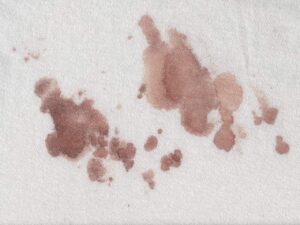As a Washington state biohazard remediation company, we often encounter blood on our cleanup projects. Our technicians wear protective gear and they’ve been trained to identify and avoid contamination with blood, but that might not be true of workers in other industries. Many people get exposed to blood in the course of their jobs, and it’s very important to be aware of just how dangerous blood might be.
Blood itself isn’t the threat; it’s the microorganisms it can contain or provide a food source to that are problematic and potentially fatal. In fact, the three most common ones – hepatitis B, hepatitis C, and HIV – can cause death. But there are many others as well. And it’s not just bacteria or viruses blood may harbor; there may be dangerous drugs like heroin or fentanyl present as well. Because of these health threats, we highly recommend you hire a professional biohazard company to clean up messes where blood is involved.
But often encountering blood is a regular workplace hazard, especially for those in the health care sector as well as first responders. Those in the housekeeping industry are at risk. Even sanitation workers might be exposed to blood during routine trash pick-up and transfer. And with IV drug use at an almost epidemic state, a prick from a used hypodermic needle might expose someone to contaminated blood. (Because of this, we get concerned when volunteer groups and others with no training handle homeless camp cleanup. Discarded, contaminated needles are usually in abundance on these sites.)
Because the potential of a blood-borne pathogen is so extensive, one thing we highly recommend is that people are made aware of the dangers that handling discarded needles and syringes can pose. A needlestick is probably the most common way someone inadvertently gets exposed to contaminated blood. We can’t say it enough: DO NOT handle a discarded needle with bare hands; where protective gear and exercise extreme caution. Dispose of needles and other sharps appropriately. Employers should also educate their workers on what to do in the event of an exposure. Emergency information should be posted. The CDC has good basic information on what to do in case of an exposure: click here to visit the CDC reference guide.
Something else to consider for those who routinely encounter blood in the course of their employment: getting a Hep-C vaccination. While there are no vaccines currently available for HIV or Hep-B, you can protect yourself against Hep-C. And if blood spills are a regular occurrence at your place of business, you may want to consider talking to us about safe and effective cleanup.

 It is not uncommon for someone to die without anyone present. This is referred to as an unattended death. It may be a suicide, a crime-related fatality, or a death from natural causes of someone who lived alone and whose passing wasn’t noticed at first.
It is not uncommon for someone to die without anyone present. This is referred to as an unattended death. It may be a suicide, a crime-related fatality, or a death from natural causes of someone who lived alone and whose passing wasn’t noticed at first.
 But what about cleaning up when blood is present?
But what about cleaning up when blood is present?

